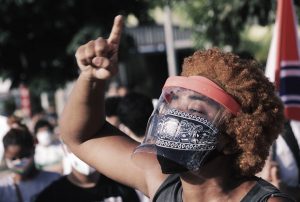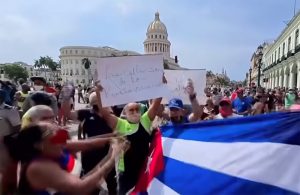Cuban journalist Lázaro Yuri Valle Roca, who has been in precautionary detention for over a year, has been sentenced to six years in prison for “enemy propaganda” and “resistance” charges.
The sentence drew backlash from international organizations and even the U.S. Embassy in Cuba, which issued a protest note saying the Cuban government’s accusation was “ridiculous.”
Valle Roca, 60, is the director of the blog and YouTube channel Delibera. He was arrested in June 2021 after recording and broadcasting a video of activists throwing pro-democracy leaflets from a building. Cuban police associated the journalist with the printing of posters.
Cuban justice, journalist announces country’s ‘instability’
Persecution of the press in Cuba intensified during the pandemic. The peak of the crackdown came when many were arrested along with activists during protests on the island in July last year.
Last May, the country’s parliament unanimously passed a New Penal Code that further threatens independent journalism by blocking external financing and including new offenses such as “disturbing public order” that could be used against communicators.
Valle Roca does not appear to have been convicted under the new Cuban Penal Code. But the sanctioning of the sentence by the country’s justice has drawn criticism from journalist organizations, who see the measure as excessive and a way to silence independent journalists in the country.
The Cuban journalist was arrested on June 15, 2021, after being summoned by the police for a resistance crime at a police station to close another investigation in 2020.
However, law enforcement arrested him on new charges. Days ago, Valle Roca recorded and posted on social media footage of activists throwing leaflets from the roof of a building with the words of Cuban leaders José Martí and Antonio Maceo.
The action was held to commemorate the 176th anniversary of the birth of Maceo, the general of the Cuban war of independence. Apart from that, three more people were arrested for allegedly participating in the protest.
According to Radio Televisión Martí, they were all accused of “planning acts contrary to the existing social and political system in Cuba, which were carried out in different parts of the country’s capital, filmed and posted on their Facebook profiles and other social networks. members, in order to spread the image of social and political instability within the country to the world.
In a phone call with his wife after the sentence was announced, the Cuban journalist thanked those who supported him. The audio was broadcast by Radio Televisión Martí.
“Since my arbitrary and unjust imprisonment by the arrogant, totalitarian and slave-owning dictatorship of Castro-Canelista, I want to thank all my friends, brothers in struggle and family members who have united their voices and souls to seek my freedom.
The dictatorship’s pressures, ill-treatment, impunity have not been successful and will not demoralize me. They imprisoned my body but not my mind.”
Trial of ‘fake’ journalist
The Committee to Protect Journalists (CPJ) stressed the cautious nature of the court hearing that convicted the journalist, which took place behind closed doors in Havana on 28 June.
“Cuban journalist Lázaro Yuri Valle Roca was forced to appear in a sham trial after being imprisoned for more than a year in a pre-trial detention order,” said Natalie Southwick, CPJ Latin America and Caribbean Coordinator.
“Cuban authorities must release him immediately and stop treating independent journalists as criminals,” he said.
The US embassy in Cuba also sentenced Valle Roca to six years in prison. In a post he made on social media, he demanded his immediate release and said “journalism is not a crime”.
We also demand the immediate and unconditional release of journalist Lázaro Yuri Valle Roca. Government’s nonsense #Cuba He accuses him of so-called “desacato” and “enemy propaganda” crimes. Journalism is not a crime. #Arrested For What https://t.co/nqHdNmjjsH
— Embajada de los Estados Unidos en Cuba (@USEmbCuba) July 5, 2022
In a phone call with his wife after the sentence was announced, the Cuban journalist thanked those who supported him. The audio was broadcast by Radio Televisión Martí.
Since my arbitrary and unjust imprisonment by the arrogant, totalitarian and slave-owning dictator Castro-Canelista, I want to thank all my friends, brothers in struggle and family members who have united their voices and souls to seek my freedom.
The dictatorship’s pressures, ill-treatment, impunity have not been successful and will not demoralize me. They imprisoned my body but not my mind.”
2021 protests worsen press freedom in Cuba
Finally World Press Freedom Ranking According to the report of Reporters Without Borders (RSF), released on May 3, Cuba was ranked 174th out of 180 countries.
RSF noted that the island remains “the worst country for press freedom in Latin America every year.” This is because all Cuban media outlets are closely monitored by the government, as the privately owned press is banned by the Constitution.
“Independent journalists are also under surveillance by agents whose aim is to curtail their mobility, interrogate reporters, and wipe their information,” the NGO says.
As a clear example of journalist Lázaro Yuri Valle Roca’s experience, he adds, “Although bloggers and citizen-journalists see an area of freedom on the Internet, they surf at their own risk and are often arrested or forced into exile.”
Also Read | According to the report, freedom of expression is falling by 80% in the world and in Brazil in ten years
The already inevitable scenario has been worsened with a change to the Penal Code that came ten months after Cuba registered mass protests against government measures during the covid-19 pandemic. They were the largest demonstrations in the country since the 1990s.
On this occasion, Cubans took to the streets to protest the food shortage and the lack of vaccines against covid-19.. The country contained the pandemic in its first year, but experienced a period of worsening in the second half of 2021.
The demonstrations ended with the arrests of dozens of journalists and activists. A month later, the government issued new regulations on the use of social networks and the Internet, criminalizing public incitement actions that “change public order”.
Also Read | A month after mass protests, Cuba passes internet law blocking anti-government demonstrations
A March letter from the Coalición por la Libertad de Asociación, which brings together 21 Latin American civil organizations, called on the international community to demand that the Cuban government end the persecution of journalists, human rights defenders and other citizens who oppose Miguel’s regime. Diaz-Canel.
The document was released when the country’s Supreme Court convicted 128 Cubans who took part in the protests in July last year.
read it too
source: Noticias
[author_name]

